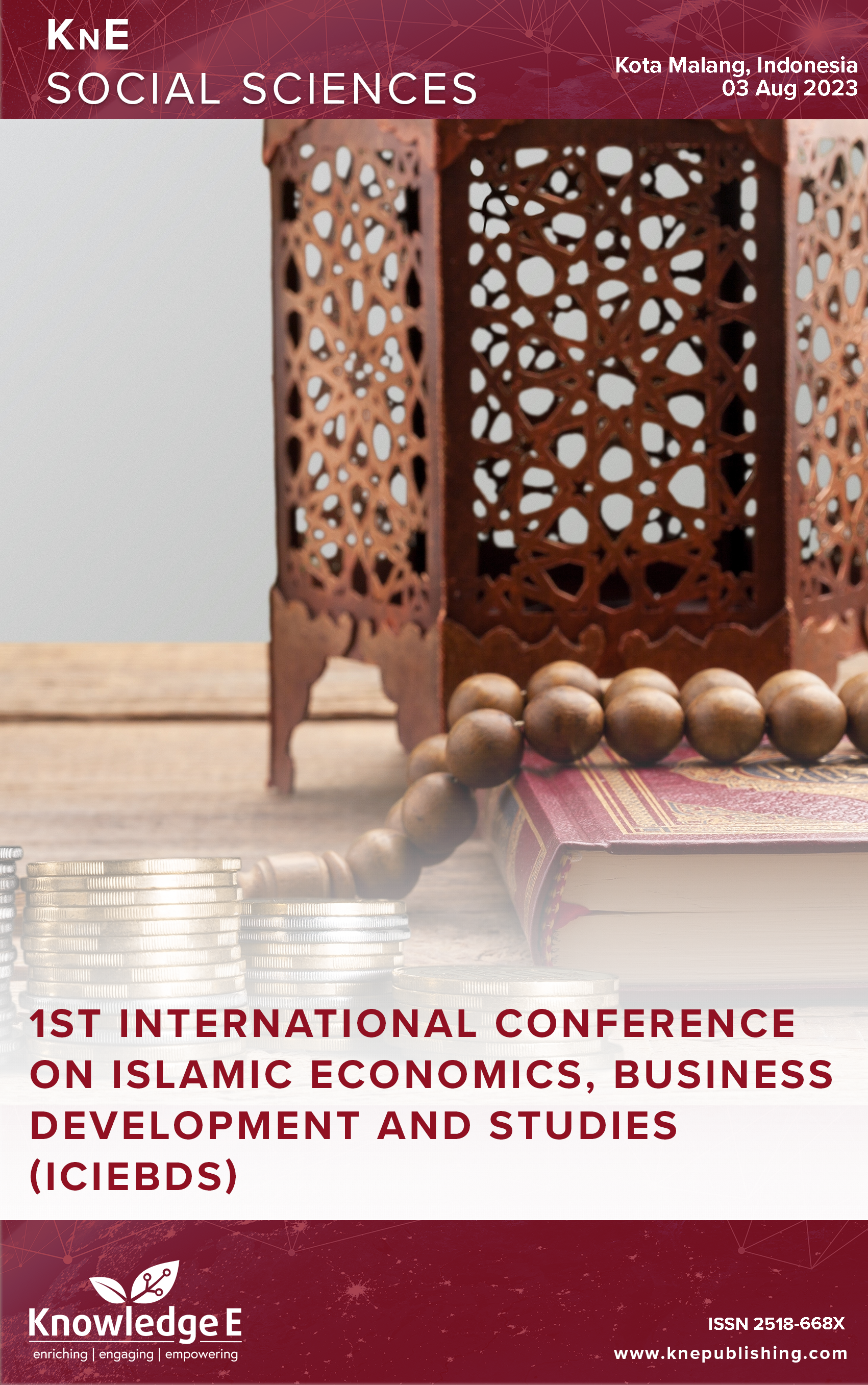The Role of Sharia Economy in Poverty Reduction in Indonesia
DOI:
https://doi.org/10.18502/kss.v9i16.16259Abstract
This research aims to analyze the role of Sharia economics in alleviating poverty in Indonesia. The method used in this research is a literature study, which is a series of activities relating to methods of collecting library data, reading and taking notes, as well as processing reading material into research data. Some of the literature that researchers use as data sources are books, journal articles, and news related to the role of Sharia economics in reducing poverty rates in Indonesia. One of the goals of religion is to encourage people from being left behind economically. Poverty is a serious problem that must be sought immediately for a solution because it can have very dangerous impacts, including disturbing one’s faith or it could even disappear and that person becomes a disbeliever. The potential for ziswaf in Indonesia is extraordinary. If it can be managed professionally, it will have an impact on the welfare of society. How to overcome poverty can be done with various steps and strategies. The thing that must be done from the start to overcome the poverty that grips our society is to create an economic order that allows for a fair distribution system to be born, encouraging the birth of concern from people who have (aghniya’) toward the needy, poor, dhu’afa’ and mustard ’affine. One form of concern for Aghniya’ is his willingness to pay zakat and issue sadaqah.
Keywords: ZISWAF, poverty alleviation, economic Sharia
References
M. N. R. Al Arif, “Wakaf uang dan pengaruhnya terhadap program pengentasan kemiskinan di Indonesia,” 2012. https://doi.org/10.15408/idi.v2i1.1649. DOI: https://doi.org/10.15408/idi.v2i1.1649
Yang X, Hung K. Poverty alleviation via tourism cooperatives in China: the story of Yuhu. Int J Contemp Hosp Manag. 2014;26(6):879–906. DOI: https://doi.org/10.1108/IJCHM-02-2013-0085
L. T. Purbasari, R. Sukmana, and R. T. Ratnasari, “Efektivitas Zakat, Infaq Dan Shodaqoh Dalam Mengentaskan Kemiskinan Di Indonesia: Menggunakan Teknik Basic Needs Deficiency Index,” J. Ekon. Syariah Teor. dan Terap., vol. 7, no. 2, pp. 222–233, 2020. https://doi.org/10.20473/vol7iss20202pp222-233. DOI: https://doi.org/10.20473/vol7iss20202pp222-233
Rakhmawati I, Afandi J. Ekonomi Syariah: Menjawab Strategi Pemulihan Ekonomi Pasca Pandemi. TAWAZUN J. Sharia Econ. Law. 2022;5(1):74. DOI: https://doi.org/10.21043/tawazun.v5i1.14486
Utami P. Basrowi, and M. Nasor. The Role of Digital Zakat Towards Economic Development at Slums in Indonesia. 2021;11:45–51.
Hadi R, Shafrani YS, Hilyatin DL, Riyadi S, Basrowi B. Digital zakat management, transparency in zakat reporting, and the zakat payroll system toward zakat management accountability and its implications on zakat growth acceleration. Int. J. Data Netw. Sci. 2024;8(1):597–608. DOI: https://doi.org/10.5267/j.ijdns.2023.8.025
Bahitsul AF, Karunia I, Amalia NF. Distingsi Pemberdayaan Masyarakat Melalui ZISWAF dalam Meningkatkan Ekonomi Masyarakat. Manag. Zakat Waqf J. 2021;3(1):29–44. DOI: https://doi.org/10.15642/mzw.2021.3.1.29-44
Dasangga R, Ghani D, Cahyono EF. Analisis peran zakat terhadap pengentasan kemiskinan dengan model CIBEST (Studi kasus rumah Gemilang Indonesia kampus Surabaya). J. Ekon. Syariah Teor. Dan Terap. 2020;7(6):1060–73. DOI: https://doi.org/10.20473/vol7iss20206pp1060-1073
Ahmad M. Role of waqf in sustainable economic development and poverty alleviation: bangladesh perspective. JL Pol’y Glob. 2015;42:118.
Amirudin C, Sabiq AF. The Role of Ziswaf in Restoring the People’s Economy Due to the Covid-19 Pandemic Period BAABU AL-ILMI Journal. Islamic Economics and Banking. 2021;6(1):38. DOI: https://doi.org/10.29300/ba.v6i1.4074
Abidin A, Utami P. the Regulation of Zakat Digital Technology in Creating Community Welfare Impact on Economic Development. J. Leg. Ethical Regul. Issues. 2020;23(5):1–9.
P. Utami, T. Suryanto, R. A. Ghofur, and M. Nasor, “Refleksi Hukum Zakat Digital Pada BAZNAS dalam Rangka Peningkatan Kesejahteraan Mustahik,” J. Surya Kencana Satu Din. Masal. Huk. dan Keadilan, vol. 11, no. 1, pp. 53–70, 2020. https://doi.org/10.32493/jdmhkdmhk.v11i1.5608.ers, 2017. DOI: https://doi.org/10.32493/jdmhkdmhk.v11i1.5608
L. Saleh, “Perubahan Nilai Tukar Uang Menurut Perspektif Ekonomi Islam,” Li Falah J. Stud. Ekon. dan Bisnis Islam, vol. 1, no. 1, pp. 68–79, 2016. https://doi.org/10.31332/lifalah.v1i1.475. DOI: https://doi.org/10.31332/lifalah.v1i1.475
M. Sulhan, “Transaksi Valuta Asing (al-Sharf) Dalam Perspektif Islam,” Iqtishoduna, vol. 3, no. 2, 2008. DOI: https://doi.org/10.18860/iq.v3i2.257
Tamam AN, Muslikhati M. Analisis Korelasi Nilai Tukar Rupiah terhadap Dolar Amerika Serikat dan Pertumbuhan Ekonomi Indonesia dalam Perspektif Islam. Iqtishodia J. Ekon. Syariah. 2019;4(1):50–70. DOI: https://doi.org/10.35897/iqtishodia.v4i1.224
Karim AA. Ekonomi Makro Islami. Jakarta: Rajawali Pers; 2011.
N. Erawati and R. Llewelyn, “Analisa pergerakan suku bunga dan laju ekspektasi inflasi untuk menentukan kebijakan moneter di Indonesia,” J. Manaj. dan Kewirausahaan, vol. 4, no. 2, pp. 98–107, 2002.
A. Rahim, “Konsep Bunga Dan Prinsip Ekonomi Islam Dalam Perbankan Syariah,” Hum. FALAH J. Ekon. dan Bisnis Islam, vol. 2, no. 2, pp. 1–15, 2015.
Basri F, Munandar H. Dasar-dasar ekonomi internasional: pengenalan dan aplikasi metode kuantitatif. Jakarta (ID): Kencana; 2010.
D. Salvatore and H. Munandar, “Ekonomi Internasional, jilid 2,” 1997.
Al-Farran AM. Tafsir Ayat Imam Syafii. Jakarta: PT Niaga Swadaya; 2007.
Pusat pengkajian dan pengembangan ekonomi Islam, Ekonomi islam. Jakarta: Rajawali Pers; 2015.
Viva Kusnandar, “Inflasi Indonesia Capai Rekor Tertinggi dalam Sewindu,” kata data.
Ihatec, “Produk Halal Indonesia di Pasar Global.”
Purba JH, Magdalena A. Pengaruh Nilai Tukar Terhadap Ekspor dan Dampaknya Terhadap Pertumbuhan Ekonomi Indonesia. DeReMa J. Manaj. 2017;12(2):285–95. DOI: https://doi.org/10.19166/derema.v12i2.500
Taufiq M, Natasah NA. Analisis pengaruh nilai tukar terhadap ekspor komoditas unggulan Indonesia. J. Din. Ekon. Pembang. 2019;2(1):141–6. DOI: https://doi.org/10.33005/jdep.v2i1.85
Suprianto S, Syapsan S, Darmayuda D. Analisis Pengaruh Kurs Dan Suku Bunga BI Rate Terhadap Ekspor Pertanian Indonesia Ke Amerika Serikat. Riau University; 2017.
R. Qoni’ah, “Tantangan dan strategi peningkatan ekspor produk halal Indonesia di pasar global,” Halal Res. J., vol. 2, no. 1, 2022. https://doi.org/10.12962/j22759970.v2i1.246. DOI: https://doi.org/10.12962/j22759970.v2i1.246

